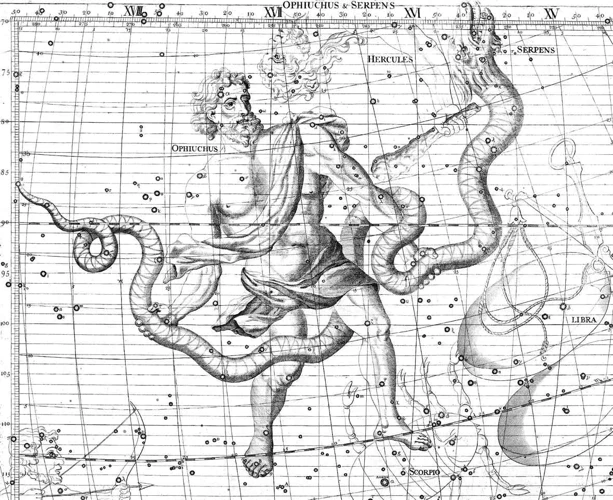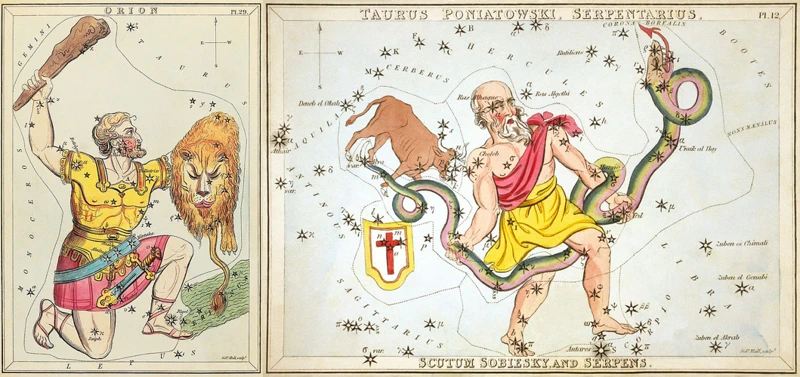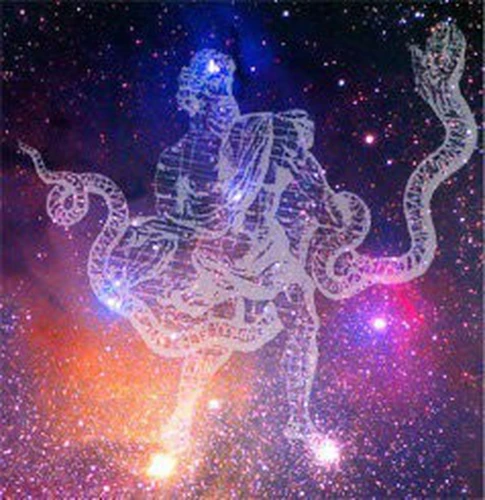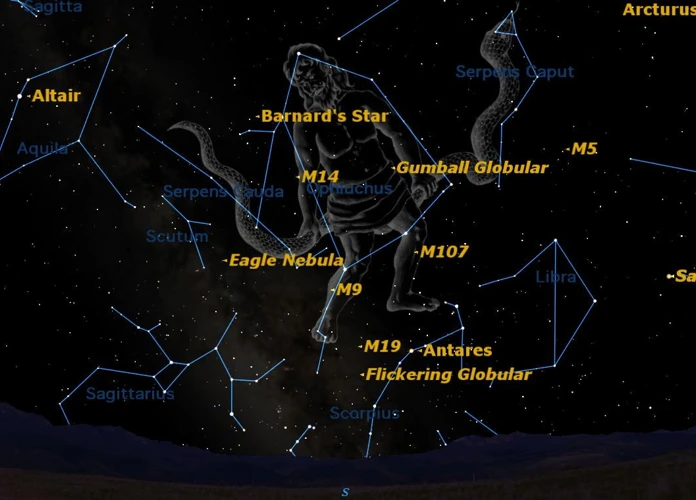Have you ever heard of Ophiuchus? This mysterious and lesser-known constellation has a rich symbolism and mythology that often goes unnoticed. Exploring the origins of Ophiuchus and its significance in different cultures, we uncover a fascinating tale of serpents, gods, and astrological interpretations. Join us on a journey as we delve into the hidden world of Ophiuchus, shedding light on its enigmatic nature and its place in popular culture. Prepare to be captivated by the intriguing story behind this often overlooked constellation.
The Origin of Ophiuchus

The origin of Ophiuchus dates back to ancient times when civilizations looked to the stars for guidance and meaning. This constellation, also known as the Serpent Bearer, has deep roots in mythology and astrology. Some believe that Ophiuchus represents the Greek god Asclepius, the son of Apollo and the god of medicine. According to ancient texts, Asclepius was taught the secret of healing by a snake, which became a symbol of wisdom and rebirth. The significance of serpents in Ophiuchus’ origin is further highlighted by their presence in different cultures and mythologies. The connections between Ophiuchus and serpents can be traced to ancient Egyptian, Babylonian, and Mesoamerican civilizations, where serpents were revered as symbols of fertility, renewal, and cosmic knowledge. The serpent symbolism behind Ophiuchus is truly captivating and adds to the mystique of this constellation. Exploring the historical texts and astronomical observatories associated with Ophiuchus offers a deeper understanding of its origins. The secrets and mysteries of Ophiuchus continue to fascinate researchers and stargazers alike, making it an intriguing subject of study. Navigating the Ophiuchus constellation in ancient times unveils the ancient navigational techniques used to identify and locate this enigmatic constellation. By exploring the ancient astronomical observatories connected to Ophiuchus, we can glimpse into the past and discover how ancient civilizations studied and interpreted this celestial figure. The origin of Ophiuchus is shrouded in mystery, but by delving into historical texts and ancient artifacts, we can gain glimpses into its fascinating past.
Serpent Symbolism

The serpent symbolism associated with Ophiuchus is deeply rooted in ancient cultures and holds a multitude of meanings. Serpents have long been regarded as powerful symbols in various civilizations across the globe. In many ancient cultures, the serpent represented rebirth, transformation, and wisdom. The connection between Ophiuchus and the serpent is significant, as it ties into the constellation’s mythology and astrological interpretations. The serpent’s association with knowledge and healing can be traced back to the Greek god Asclepius, whose symbol, the Rod of Asclepius, is intertwined with a serpent. This representation signifies the intertwining of wisdom and medicine. Exploring the secrets of Ophiuchus revealed in historical texts offers further insight into the serpent symbolism and its role in understanding the deeper meaning behind Ophiuchus. The serpent’s symbolism holds a rich tapestry of interpretations that add to the allure and mystique of Ophiuchus as a constellation.
The Serpent in Ancient Cultures
The serpent holds a significant place in ancient cultures, being a symbol of power, wisdom, and transformation. Across various civilizations, the serpent was revered and had diverse interpretations. In ancient Egyptian mythology, the serpent was associated with the sun god, Ra, and was seen as a protector and a symbol of royalty. The Ouroboros, a serpent or dragon swallowing its own tail, represented eternal cycles and the cyclical nature of life and death. In Mesopotamian mythology, the god Ningizzida was depicted as a serpent with the ability to grant knowledge and immortality. The serpent was also linked to fertility and rejuvenation in Mesoamerican cultures, particularly among the Mayans and Aztecs. Quetzalcoatl, the feathered serpent deity, was considered a bringer of knowledge and civilization. In Greek mythology, the serpent was associated with the healing god Asclepius, who was known for his association with snakes. The serpent’s shedding of its skin became a symbol of renewal and regeneration. These ancient cultures recognized the serpent’s dual nature, representing both creation and destruction, and embraced its symbolism in their myths and beliefs. The serpent’s significance in ancient cultures serves as a foundation for understanding the association between serpents and Ophiuchus, the Serpent Bearer.
Ophiuchus as the Serpent Bearer
Ophiuchus is often depicted as the Serpent Bearer, a figure holding a snake or serpent. This symbolism is deeply rooted in ancient cultures and carries significant meaning. In various mythologies, the serpent has a duality of representing both creation and destruction, wisdom and trickery. The association of Ophiuchus with the serpent signifies the balance of these opposing forces.
In ancient Egyptian mythology, the snake was seen as a powerful symbol of divine energy and rebirth. The god Osiris, known as the ruler of the afterlife, was often depicted wearing the Uraeus, a serpent-shaped headdress that represented his divine authority. This connection to serpents suggests that Ophiuchus, as the Serpent Bearer, may have been associated with the realm of the divine and the mysteries of life and death.
In Greek mythology, Ophiuchus is often identified with Asclepius, the god of medicine and healing. Asclepius was believed to possess extraordinary healing powers, which were symbolized by a staff entwined with a serpent. The Rod of Asclepius, as it is known, has since become a universal symbol of medicine and is seen in modern medical emblems. This association reinforces the idea of Ophiuchus as the Serpent Bearer, representing knowledge, healing, and the transformative power of snakes.
Ophiuchus as the Serpent Bearer not only holds significance in ancient cultures but also has connections to astrology. In astrology, Ophiuchus is considered the 13th zodiac sign, representing individuals born between November 29 and December 17. Those born under this sign are believed to possess traits such as wisdom, intuitive abilities, and a deep connection to the spiritual realm. Ophiuchus challenges the traditional zodiac system and adds another layer of complexity to astrological interpretations.
The symbolism of Ophiuchus as the Serpent Bearer is deeply intertwined with the mysteries of life, death, healing, and wisdom. It is a testament to the enduring fascination humans have with the serpent and its multifaceted symbolism in various cultures and belief systems. Ophiuchus’ connection to the serpent elevates its significance and continues to captivate those who seek to uncover the hidden truths within this enigmatic constellation.
Mythological Connections

Mythological connections to Ophiuchus span across different cultures and civilizations, each offering unique insights into the symbolism of this constellation. In Greek mythology, Ophiuchus is often associated with the legendary healer Asclepius, who possessed the ability to resurrect the dead. Asclepius’ connection with serpents and their healing properties is a recurring theme in many ancient myths. Other mythologies also incorporate Ophiuchus into their stories. In Egyptian mythology, Ophiuchus is linked to the god Imhotep, who was revered as a great healer and architect. In Mayan culture, Ophiuchus is associated with the deity Kukulkan, depicted as a feathered serpent. These mythological connections not only add depth and intrigue to the constellation of Ophiuchus but also showcase its cultural significance and enduring symbolism throughout history.
Ophiuchus in Greek Mythology
In Greek mythology, Ophiuchus has a prominent role as the embodiment of Asclepius, the god of medicine and healing. According to ancient Greek tales, Asclepius was a mortal who possessed incredible healing powers, learned from the serpent. Asclepius became renowned for his ability to resurrect the dead, causing concern among the gods. In fear of his abilities, Zeus struck him down with a thunderbolt, thus immortalizing him as the constellation Ophiuchus. This depiction of Ophiuchus as a healer and a bringer of life represents the eternal struggle between life and death, mortality and immortality. The Greek mythology associated with Ophiuchus also highlights the serpent’s role in bestowing knowledge and wisdom upon humanity. The celestial figure of Ophiuchus is a testament to the Greeks’ fascination with the intertwining concepts of healing, life, and death, making it a captivating character within their mythological pantheon.
Ophiuchus in other Mythologies
Ophiuchus, although predominantly known in Greek mythology, has also made appearances in other mythologies around the world. In Norse mythology, Ophiuchus is associated with the god Balder, who was known for his beauty and bravery. Balder’s death and subsequent resurrection mirrored the concept of rejuvenation and regeneration, much like the serpent shedding its skin. In Celtic mythology, the figure of Ophiuchus can be linked to the legendary hero Cúchulainn. Cúchulainn possessed great healing abilities and was also associated with serpents, emphasizing the connection between Ophiuchus and the art of healing. In Chinese mythology, the constellation is often identified as the figure of the herbalist Shennong, credited with discovering countless medicinal plants. The symbolism of Ophiuchus as a healer and guardian of wisdom resonates across different mythologies, showing the cross-cultural significance of this celestial figure.
Here is a table summarizing Ophiuchus’ presence in other mythologies:
| Mythology | Associated Figure | Key Attributes |
|---|---|---|
| Norse | Balder | Beauty, bravery, resurrection |
| Celtic | Cúchulainn | Healing abilities, association with serpents |
| Chinese | Shennong | Discovery of medicinal plants |
These mythological connections highlight the universal themes of healing and wisdom associated with Ophiuchus. Despite variations in cultures and traditions, the portrayal of Ophiuchus remains consistent, emphasizing its enduring significance in different mythologies.
Astrological Interpretation

Astrological interpretation of Ophiuchus brings a unique perspective to the zodiac. Ophiuchus is often considered as the thirteenth zodiac sign, alongside the traditional twelve signs. Although not officially recognized in Western astrology, Ophiuchus has gained popularity in recent years. People born under this sign are believed to possess traits such as wisdom, healing abilities, and a deep connection to spirituality. The alignment of the stars and planets at the time of one’s birth can offer insight into their personality and life path. Ophiuchus introduces a new dynamic to astrological charts, offering individuals a chance to explore different aspects of their character and destiny. While controversy surrounds the inclusion of Ophiuchus in astrology, its influence continues to intrigue astrology enthusiasts and prompts discussions about the evolving nature of the zodiac.
Ophiuchus and the Zodiac
Ophiuchus and the Zodiac are intertwined in a complex relationship that has sparked much debate and curiosity among astrologers and enthusiasts. Traditionally, the Zodiac consists of twelve signs that align with the path of the Sun throughout the year, with each sign representing certain personality traits and characteristics. However, the inclusion of Ophiuchus as the thirteenth sign has stirred controversy and raised questions about its role in astrology. Some astrologers argue that Ophiuchus should be recognized as a legitimate sign due to its position on the ecliptic, the apparent path of the Sun. They believe that individuals born between November 29th and December 17th should identify with Ophiuchus instead of their original zodiac sign. This shift would not only alter the dates associated with the traditional Zodiac signs but also introduce new personality traits and characteristics attributed to Ophiuchus. However, skeptics argue that the inclusion of Ophiuchus would disrupt the symmetry and balance of the Zodiac. They claim that the addition of a thirteenth sign would require recalibrating existing astrological charts and systems, leading to confusion and inconsistency. Despite the ongoing debate, it is important to note that mainstream Western astrology currently does not recognize Ophiuchus as a sign within the Zodiac. However, in other astrological traditions and cultures, Ophiuchus holds significance and is considered a powerful and influential figure. The connection between Ophiuchus and the Zodiac continues to be a subject of intrigue, sparking interest among those seeking to unravel the mysteries of astrology.
Personality Traits of Ophiuchus
The personality traits associated with Ophiuchus are as intriguing and complex as the constellation itself. While Ophiuchus is not traditionally recognized as one of the zodiac signs, those born under this constellation are said to possess unique qualities. People born under Ophiuchus are often described as natural healers and have a deep sense of empathy and understanding. They are compassionate individuals who are always willing to lend a helping hand and offer support to those in need. Ophiuchus individuals are known for their wisdom, intelligence, and an innate ability to see beyond the surface. They have a thirst for knowledge and are constantly seeking to expand their understanding of the world. This hunger for knowledge often leads them to be great thinkers and problem solvers. Ophiuchus individuals are also highly intuitive and possess strong intuition. They have a knack for sensing things that others may not notice, and this helps them navigate through life’s challenges. Additionally, Ophiuchus individuals are seen as charismatic and magnetic, drawing people towards them with their warm and friendly nature. While they have a natural inclination towards leadership, they also value harmony and cooperation in their relationships. These individuals have an adventurous spirit and are not afraid to take risks and embrace change. Their flexible nature allows them to adapt to new situations and overcome obstacles with ease. Despite their many positive traits, Ophiuchus individuals may also face challenges. They can be prone to being overly idealistic and may struggle with balancing their emotions. However, with self-awareness and introspection, they can harness their strengths and navigate through life successfully. The personality traits of Ophiuchus make individuals born under this constellation unique and fascinating. They bring a different perspective and energy to the world, making them truly special.
Ophiuchus in Popular Culture
Ophiuchus may not be as widely recognized as other constellations, but it has certainly left its mark on popular culture. In recent years, there has been a resurgence of interest in astrology, and with it, a renewed fascination with Ophiuchus. The inclusion of Ophiuchus as a 13th zodiac sign in some astrological systems has sparked discussions and debates among astrology enthusiasts. This newfound attention has led to Ophiuchus making appearances in various forms of media, including literature, music, and art. In literature, Ophiuchus has been featured in fantasy novels and science fiction stories, often portrayed as a powerful and enigmatic character with connections to healing and mysticism. Musicians have also drawn inspiration from Ophiuchus, incorporating its symbolism and mythology into their lyrics and album artwork. In the art world, Ophiuchus has been depicted in paintings, sculptures, and even tattoos, with artists exploring the rich symbolism and captivating imagery associated with this constellation. Ophiuchus’ presence in popular culture serves to further ignite curiosity and intrigue around this hidden constellation. As awareness grows, we can anticipate Ophiuchus continuing to appear in books, movies, and other forms of entertainment, captivating audiences with its mystical allure and unique qualities. Ophiuchus’ journey from obscurity to popular culture icon is a testament to its enduring appeal and the human fascination with the celestial realm.
Conclusion
In conclusion, Ophiuchus is a constellation that holds great symbolism and mythology. Its origin can be traced back to ancient times, where it was associated with the Serpent Bearer and the Greek god Asclepius. Serpent symbolism is found in various cultures and mythologies, emphasizing the significance of snakes in relation to wisdom and rebirth. Ophiuchus has also made its mark in astrology, being a part of the zodiac and representing unique personality traits. While Ophiuchus may not be as well-known as other constellations, its enigmatic nature has captivated the interest of astronomers, historians, and astrology enthusiasts. The celestial secrets of Ophiuchus continue to be explored, providing intriguing insights into its ancient navigational importance and connections to astronomical observatories. Whether one views it through a mythological, astrological, or cultural lens, Ophiuchus remains a celestial figure that sparks curiosity and invites further exploration. As we unravel the mysteries surrounding Ophiuchus, we gain a deeper appreciation for the wonders of the night sky and the stories it holds.
Frequently Asked Questions
1. What does the name “Ophiuchus” mean?
The name “Ophiuchus” is derived from the Greek word “ophis,” which means snake, and “khein,” which means to hold or bear. Ophiuchus is often referred to as the “Serpent Bearer.”
2. Is Ophiuchus considered a part of the zodiac?
While Ophiuchus is not officially recognized as one of the twelve zodiac constellations, it does pass through the ecliptic, the apparent path of the Sun, Moon, and planets. This has led to some debate and speculation about its inclusion in the zodiac.
3. Are there any famous stars in the constellation Ophiuchus?
Yes, Ophiuchus boasts several notable stars, including Rasalhague (Alpha Ophiuchi), the brightest star in the constellation. Other notable stars in Ophiuchus include Sabik (Eta Ophiuchi) and Cebalrai (Beta Ophiuchi).
4. What is the symbolism behind the Serpent Bearer in Ophiuchus?
The serpent symbolism in Ophiuchus represents wisdom, healing, and renewal. Asclepius, the Greek god of medicine, is often depicted holding a serpent-entwined staff, known as the Rod of Asclepius, which has become a symbol of medicine and healing.
5. Can you see Ophiuchus in the night sky?
Yes, Ophiuchus is visible in the night sky in the northern hemisphere during certain times of the year. It can be found between the constellations of Scorpius and Sagittarius.
6. Does Ophiuchus have any mythological connections?
Absolutely! In Greek mythology, Ophiuchus is associated with Asclepius, the god of medicine. Other mythologies, such as Egyptian and Mesoamerican, also have connections to serpents and healing, which align with the symbolism of Ophiuchus.
7. How does Ophiuchus influence astrology?
Ophiuchus has gained attention in recent years as some astrologers have proposed incorporating it as a thirteenth zodiac sign. Followers of astrology believe that those born under Ophiuchus may possess unique personality traits and characteristics.
8. What are the personality traits associated with Ophiuchus?
Those associated with Ophiuchus are believed to be ambitious, intuitive, and have a desire to seek knowledge and wisdom. They also possess a strong sense of justice and are natural healers and caretakers.
9. Is Ophiuchus represented in popular culture?
While Ophiuchus may not be as well-known as some of the other constellations, it has made appearances in various forms of popular culture. It has been featured in books, movies, and even video games, attracting attention for its mystical and intriguing nature.
10. How can I learn more about Ophiuchus?
If you’re interested in delving deeper into the world of Ophiuchus, there are many resources available, including books, documentaries, and online articles. Additionally, visiting planetariums or connecting with astronomy enthusiasts can provide further insights into this captivating constellation.








